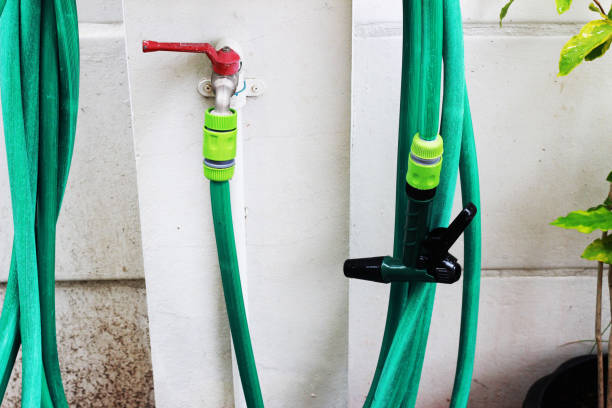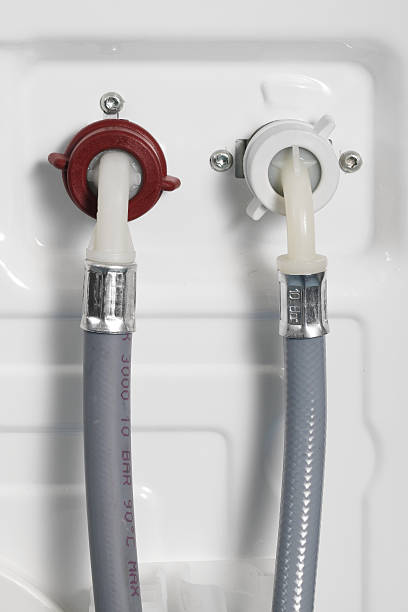Curious about a laundry hack that might just make your life a tad easier? Have you ever wondered: Can you use garden hose for washing machine?
The idea might seem intriguing, but before you hook it up, let’s dive into the nitty-gritty. In this article, I will explore the possibilities, potential pitfalls, and whether this unconventional laundry experiment is a stroke of genius or a recipe for disaster.
Get ready to unravel the truth about using a garden hose for your washing machine – the answer might surprise you!
Can You Use Garden Hose for Washing Machine?
No, you cannot use a garden hose for your washing machine. The water pressure from a garden hose is not strong enough to properly clean clothes in a washing machine and can damage the machine.
Additionally, the water temperature from a garden hose is not regulated and could be too hot or too cold for your clothes, which could also damage the fabric.
For these reasons, it is best to only use cold and/or warm water from your home’s faucets to wash clothes in your washing machine.

The Garden Hose vs. Washing Machine Hose
When it comes to hoses, not all are created equal. The seemingly humble garden hose and the purpose-built washing machine hose serve distinct functions, each tailored to their specific roles.
Design and materials
- Regular Garden Hose: Crafted with outdoor tasks in mind, such as watering plants, cleaning driveways, or filling a kiddie pool. They typically have a straightforward design, consisting of layers of flexible plastic or rubber that are reinforced with mesh for durability. They can handle low water pressure without buckling.
- Washing Machine Hose: Engineered for indoor use and the demands of modern laundry appliances. They boast a more complex design, often featuring layers of reinforced rubber or braided stainless steel to withstand high water pressure and temperature fluctuations. This design is crucial to prevent leaks, bursts, and other mishaps that could arise from the intense water flow within a washing machine.
Purposes
- Regular Garden Hose: Designed to deliver water for various outdoor tasks, catering to activities where moderate water pressure is sufficient. Its primary role is to ensure water reaches its intended target, be it a garden bed or a driveway.
- Washing Machine Hose: Provides a reliable and secure connection between your home’s water supply and your washing machine. This hose must withstand the considerable water pressure generated by the machine’s pump, and the temperature changes during different stages of the wash cycle.
Specific demands of a washing machine
A washing machine poses unique challenges that a garden hose simply isn’t equipped to handle. Washing machines require a steady and substantial water supply to operate efficiently.
During cycles, they draw water at higher pressures than what a garden hose can handle without leaking or bursting.
Moreover, washing machines often switch between hot and cold water, subjecting hoses to temperature fluctuations that could weaken materials not designed for such conditions.
Potential Pitfalls of Using a Garden Hose
Substituting a garden hose for a washing machine hose poses various risks that could result in damage to your machine property and even inconvenience in your daily life.
Leaks and bursts
One of the most immediate concerns when using a garden hose for a washing machine is the increased likelihood of leaks and bursts.
Regular garden hoses are designed for lower water pressure, typically around 40 to 70 psi (pounds per square inch). Washing machines, however, can exert water pressures that are much higher, sometimes exceeding 100 psi during certain stages of the wash cycle.
This significant increase in pressure can cause a standard garden hose to weaken, leading to leaks, cracks, and even catastrophic bursts. Such leaks can go unnoticed for a while, potentially causing water damage to your laundry area or other parts of your home.
Inadequate water supply
Another issue you may encounter is an inadequate water supply. Washing machines require a consistent and substantial water flow to function properly.
Regular garden hoses, designed for outdoor tasks, may not deliver the required water volume at the speed and pressure your washing machine demands.
As a result, your machine’s performance might suffer, affecting the quality of your laundry and potentially extending the wash cycles.
Potential damage to the washing machine
Using a garden hose not designed for the specific demands of a washing machine could lead to mechanical problems.
The increased water pressure might put undue strain on your machine’s internal components, potentially leading to premature wear and tear.
The excessive pressure could also interfere with the electronic sensors and valves that regulate water intake, affecting the accuracy of the wash cycles.
Property damage
Beyond the confines of your washing machine, there’s a risk that the wrong hose could cause damage to your property. Leaks or bursts could lead to water seepage, damaging flooring, walls, and other nearby structures.
The water damage might necessitate costly repairs and create an inconvenience that far outweighs any short-term gains from using a garden hose.
Read more: Are Washing Machine Hoses Universal?

Conclusion
Using a garden hose for your washing machine might seem tempting in the realm of laundry shortcuts. Yet, as we’ve discovered, this seemingly clever hack comes with many risks – from leaks and inadequate water supply to potential damage to your appliance and property.
Can you use garden hose for washing machine? The prudent choice lies in heeding the design and purpose of specialized washing machine hoses. While repurposing might hold charm, the potential consequences far outweigh the initial convenience.
So, when it comes to this laundry problem, the answer is clear: opt for safety, efficiency, and hoses designed to master the demands of your washing machine.







